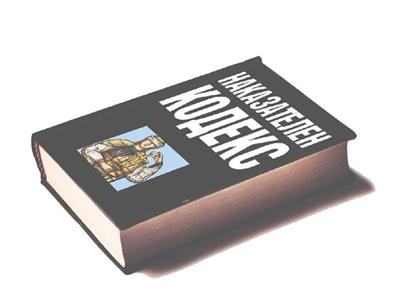POSITION OF THE AOBC ON THE AMENDMENT TO THE PENAL CODE
TO
MR DANAIL KIRILOV
PRESIDENT OF THE COMMITTEE ON
LEGAL ISSUES
THE 44TH NATIONAL ASSEMBLY
Mr BORIS YANCHEV
PRESIDENT OF THE COMMITTEE
COMBATING CORRUPTION, CONFLICT OF
INTERESTS AND PARLIAMENTARY ETHICS
THE 44TH NATIONAL ASSEMBLY
RESPONSE: Bill on amendment and supplement to the Penal Code, signature 702-01-55
Dear Lord,
The draft law provides for the establishment of criminal law provisions that regulate the responsibility of public officials and private sector officials symmetrically for the purpose of comprehensive counteraction to corruption.
The proposed changes do not find any support in the Constitution and the principles of the separation of private and public property proclaimed therein. The two forms of ownership are equal, since for each of them the law must create the same legal conditions for economic activity. Constitutional protection of property follows the logic of protecting the interests of its holder. Art. 18 para. 6 of the Constitution expressly states that state property is managed in the interest of citizens and society, and Art. 17 para. 3 proclaims inviolability of private property.
However, some of the proposed amendments incriminate acts or omissions of individuals who often combine the quality of the owner of the capital or part of it with management functions of the trading company or are sole traders. This is contrary to Art. 19 of the Constitution according to which the economy is based on a free economic initiative. Private property management actions involve freedom of contract, free pricing, and unobstructed choice of partners aimed at mutually beneficial conditions of the contracting parties. In the spending of public funds, the conclusion of contracts is subject to specific rules aiming at the most efficient utilization of the public resource in order to protect the public interest.
These fundamental constitutional differences imply a different degree of social danger in corrupt practices in the private and public sectors, and therefore require a differentiated legislative approach rather than a symmetrical regulation of the consequences of their application.
Our specific remarks are as follows:
- Paragraph 1 of the bill extends the provision of Art. 93, item 1, b. "B" of the Criminal Code. Two concepts are introduced - "public function" and "activity of public importance" (item 1a). While a legal definition is proposed for the first concept, the latter is missing. The question arises which activity is of public importance for the criminal justice system. The possibility of a broad interpretation of the second concept would lead to criminal law arbitrariness. It is imperative that the provision be considered and a precise definition drawn up.
- Paragraph 4 of the bill creates a new Art. 221 of the Criminal Code. An analogue of Art. 282, para. 1 of the Penal Code that applies to the private sector. Mechanical transfer of the features of a crime that protects a sector from public relations to another criminal organization that will protect relationships based on other principles (Article 19 (1) of the CBD) is dangerous and unacceptable. The new provision makes it possible to seek criminal responsibility for civil law relations.
Secondly, what is used in the new Art. The notion of "official duties" is incorrect. It is directly related to the concept of "service", which is mainly used for the activities of state bodies and institutions - see Art. 93, item 1 of the CC.
The ambiguity in the concept and the logic of the new text also exists with regard to the hypotheses offered - the significant adverse consequences have occurred for another individual or a legal person or a union and not as in the "mirror" art. 282, para. 1 NC (acting).
- Paragraph 6 of the Bill provides for amendments and amendments to Art. 225b of the Criminal Code. According to the proposed text, the subject of the offense is any criminal responsible person. At the same time, passive bribe requires a particular quality of the perpetrator. There are obvious contradictions between the motives and the concrete legislative proposal. In addition, in the current NC, active and passive bribery in the private sector are criminalized in Art. 225c of the CC. This text has undergone a number of checks, analyzes and assessments by European bodies and the assessment has always been that it fully responds to the necessary measures to effectively counteract corruption.
- Paragraph 7 of the Draft Act proposes in Art. 225 the term "commercial activity". However, there is no definition of that concept for the purposes of criminal law, especially since such a definition is not contained in any legislative act governing trade relations.
- Paragraph 10 of the bill amends Art. 282 with the ambition, as stated in the reasoning to be applicable to all officials, regardless of the sector in which they serve. Public relations which are subject to protection by Art. 282 et seq. Are in Chapter VIII, Section II "Offenses in Service". Content and place of the provision entitled "Crimes against the activity of state bodies, public organizations and persons performing public functions", was not affected by the bill, therefore regulates only public relations not associated with the private sector.
The inclusion of a new par. 2 of Art. 282 of the draft law provides for the prosecution of criminal liability for disciplinary violations on all grounds. The text does not contain clear criteria to distinguish offenses in a way that clearly defines the type of liability to be borne - disciplinary, administrative or criminal. This would create an interpretative chaos and arbitrariness in law enforcement.
In general, the proposed changes to the said texts of the bill are not based on a public need and can create conditions for uncertainty in the legal sphere and in the civilian turnover.
WITH RESPECT,
/ S /
BOJIDAR DANEV
Executive Chairman of BIA
and Chairman of the AOBE for 2018,
on behalf of BICA, BIA, BCCI and CEIBG






